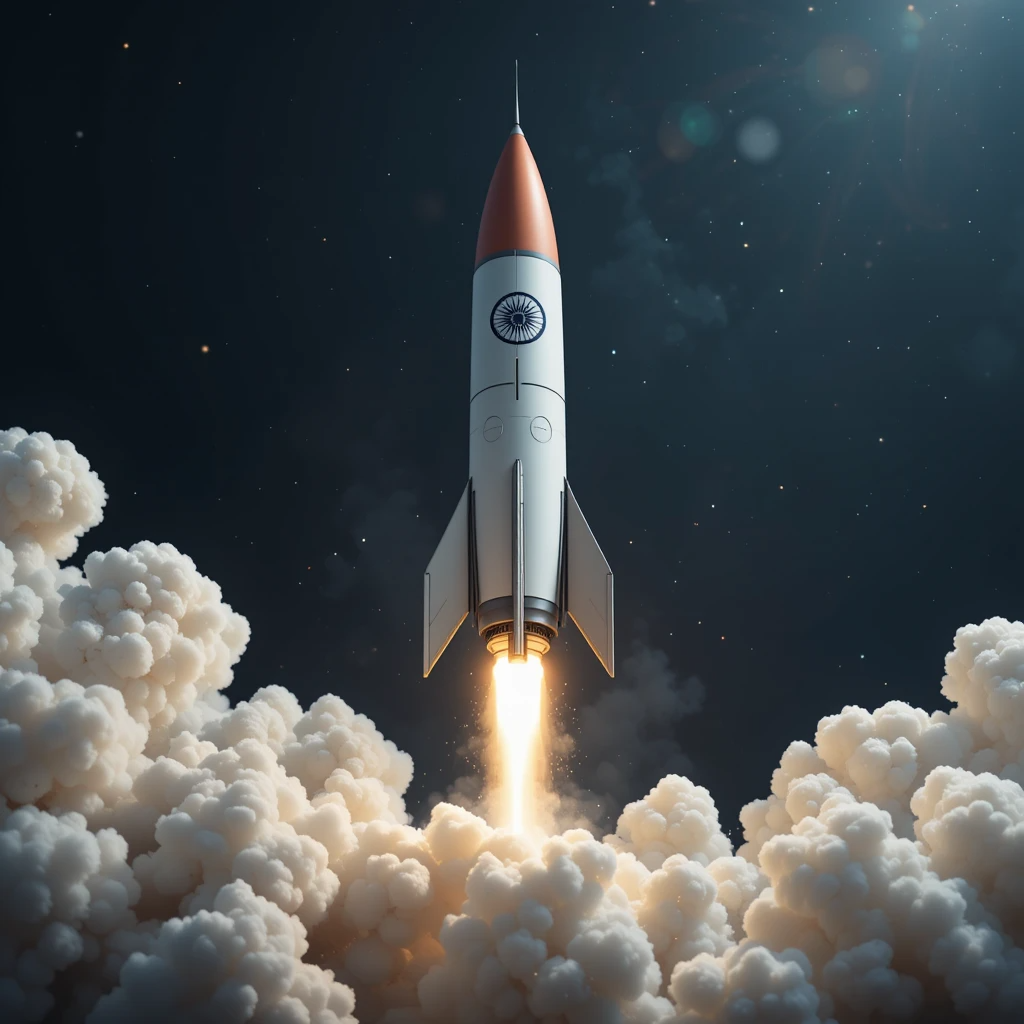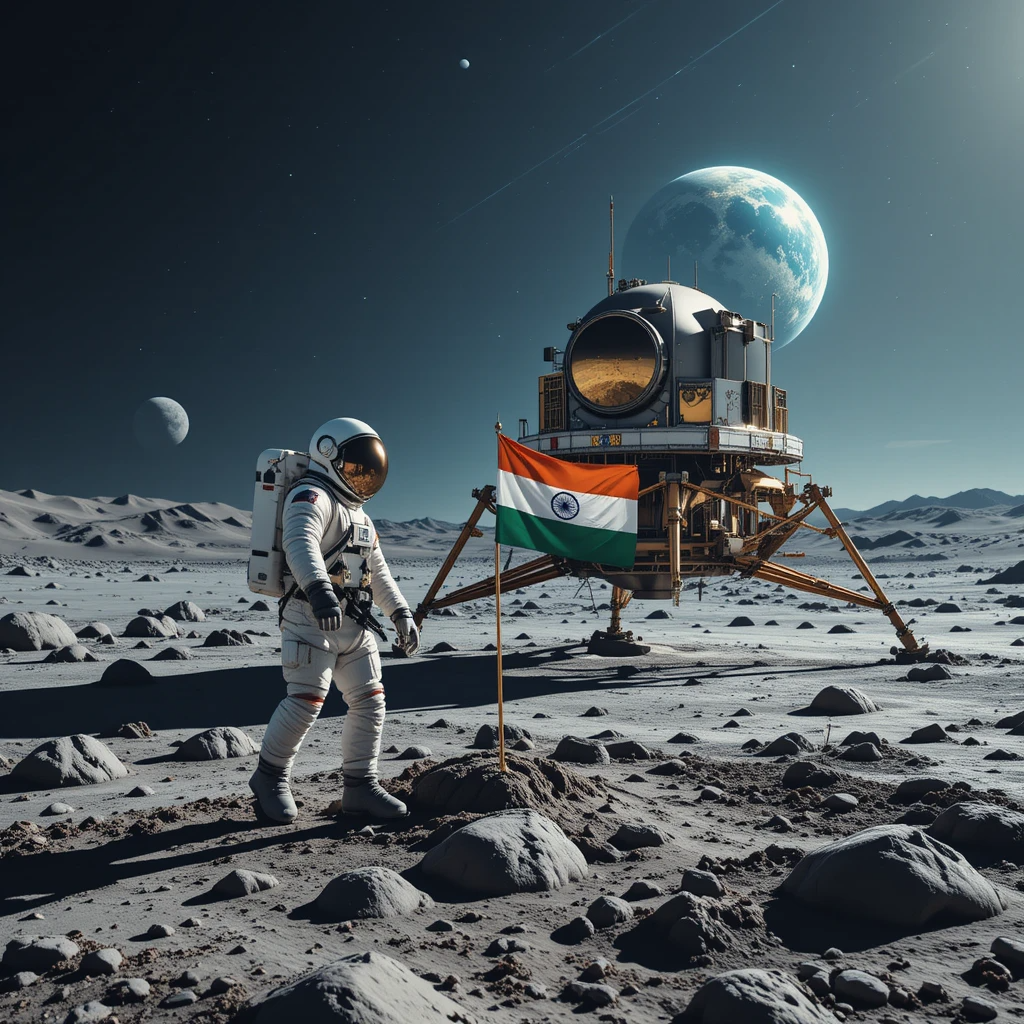Introduction: India’s Leap Toward Lunar Legacy
In a bold and inspiring move, the Indian Space Research Organisation (ISRO) has officially announced Chandrayaan-4, a groundbreaking mission that aims not only to study the Moon but to land Indian astronauts on its surface. This marks a pivotal moment in India’s space history and redefines the nation’s place among global space powers.
The Chandrayaan missions have already earned international respect, with Chandrayaan-3’s successful soft landing on the Moon’s south pole in 2023. But Chandrayaan-4 is an entirely new leap—India’s first step toward human space exploration on another celestial body.
What Is Chandrayaan-4?

Chandrayaan-4 is India’s most ambitious Moon mission to date, slated for launch in late 2025 or early 2026. Unlike previous unmanned lunar missions, this project is being designed to carry a human landing module, making it India’s first manned Moon mission.
Key Highlights of Chandrayaan-4:
-
Objective: Human landing and scientific exploration of the Moon’s surface.
-
Crew: Indian astronauts, trained under the Gaganyaan program.
-
Launch Vehicle: Likely the GSLV Mk III or the upgraded LVM3 rocket.
-
Launch Window: Targeting Q4 2025, with contingency planning for early 2026.
-
Landing Zone: South Polar region of the Moon—rich in water ice and untouched terrain.
Background: Chandrayaan Series Evolution
📌 Chandrayaan-1 (2008)
India’s first lunar probe, credited with discovering water molecules on the Moon.
📌 Chandrayaan-2 (2019)
Featured an orbiter, lander (Vikram), and rover (Pragyan), but the lander crash-landed during descent.
📌 Chandrayaan-3 (2023)
A triumphant mission. The Vikram lander and Pragyan rover successfully explored the lunar south pole.
Now, Chandrayaan-4 aims to build on these missions—but this time, carrying humans.
Human Moon Mission: India’s Space Dream Realized

With Chandrayaan-4, India joins the elite club of countries (USA, USSR/Russia, China) attempting crewed lunar missions.
The astronauts for this mission are being trained in India and Russia under ISRO’s Gaganyaan program. Sources indicate that the mission will initially carry 2 astronauts to test life-support systems and landing technology.
“Chandrayaan-4 is a natural evolution of India’s space capabilities. This is not just about going to the Moon—it’s about showing the world that India can lead in deep space exploration,” said ISRO Chairman S. Somanath.
How ISRO Plans to Land Astronauts

Chandrayaan-4 will use a modular architecture, including:
-
Orbiter: For communication and navigation.
-
Lander Module: Carries astronauts to the surface.
-
Ascent Module: Brings astronauts back to lunar orbit.
-
Service Module: Houses propulsion and fuel systems.
ISRO is collaborating with HAL (Hindustan Aeronautics Limited), DRDO, and private aerospace startups to build reliable systems, from crew modules to thermal shields.
Scientific Objectives of Chandrayaan-4
Besides human exploration, the mission will carry instruments for:
-
Lunar soil sampling
-
Seismometers to study moonquakes
-
Radiation exposure tracking
-
Water ice mapping
-
Biological experiments in Moon gravity
India aims to create a long-term lunar base by the 2030s. Chandrayaan-4 is the cornerstone of this vision.
Why the South Pole Again?
The Moon’s south polar region is a hotspot for scientists. It:
-
Contains frozen water ice—a potential source of life support and fuel.
-
Has areas of eternal sunlight—great for solar power.
-
Offers access to the Moon’s ancient crust—untouched by meteor impacts.
NASA’s Artemis III and China’s Chang’e-7 are also eyeing this region. Chandrayaan-4 could be the first crewed mission to reach there if it sticks to schedule.
Budget and Funding
Chandrayaan-4’s budget is estimated at ₹15,000 crore (~$1.8 billion USD)—nearly ten times the budget of Chandrayaan-3. Despite the steep cost, ISRO remains one of the most cost-effective space agencies in the world.
Funding is supported by:
-
Government of India
-
ISRO’s commercial arm NSIL
-
Strategic collaborations with private sector space companies
Astronaut Training Under Gaganyaan
Before flying to the Moon, astronauts must pass several milestones:
-
High-G centrifuge training
-
Vacuum chamber simulations
-
Microgravity experiments
-
Survival training in deserts, jungles, and oceans
-
Mental and psychological prep
ISRO is preparing a spaceport in Sriharikota for advanced astronaut testing and pre-launch routines.
Global Impact: Why the World Is Watching
If successful, Chandrayaan-4 will make India the fourth nation to send humans to the Moon—and possibly the first to land on the south pole.
This mission may also open doors for:
-
International collaborations
-
Commercial lunar research
-
Space tourism in India
-
ISRO’s role in NASA’s Artemis program
India’s success could trigger a space race 2.0, especially in the Indo-Pacific region.
Timeline of Mission Milestones
| Milestone | Date |
|---|---|
| Announcement | March 2025 |
| Prototype Testing | May–August 2025 |
| Final Astronaut Selection | September 2025 |
| Module Integration | October–November 2025 |
| Launch Window Opens | December 2025 |
| Lunar Landing (Planned) | January 2026 |
Social Media Buzz and Public Reactions
As soon as ISRO made the announcement, #Chandrayaan4 trended across platforms:
-
“Proud moment for every Indian 🇮🇳” – Twitter user
-
“India to Moon with humans? Wow! ISRO = Legend” – Reddit comment
-
YouTube videos predicting the mission’s timeline are already gaining millions of views.
Conclusion: A New Era in Indian Space Exploration
Chandrayaan-4 is more than just a mission—it is a national aspiration, a technological marvel, and a message to the world that India is ready for deep space leadership.
With ISRO’s proven track record, the backing of a billion hopeful hearts, and cutting-edge science behind it, Chandrayaan-4 could be the most historic mission of 2025.
Stay tuned. The Moon may soon echo with Indian footsteps.





